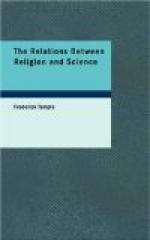But in the second place, the New Testament contains not only a new morality, it contains also a new account of human nature. The mystery of that discord which makes the noblest and best of human souls a scene of perpetual internal conflict is acknowledged and its counterpart in God’s dealings with mankind is set forth. The struggle between the spiritual faculty asserting its due supremacy, and the lower passions and appetites, impulses and inclinations, is so described by Saint Paul that none have ever since questioned his description with any effect. And our Lord’s teaching of our absolute dependence on God and helplessness without Him; and Saint John’s teaching that the whole world, outside Christ, ‘lieth in the wicked one,’ lay down the same truth. And as the mystery of moral evil in mankind is thus set forth, so too the mystery of the remedy for that evil. In the love of God shown in the Cross of Christ, in our union with God through that same Death upon the Cross is the power which conquers evil in the soul and carries a man ever upward to spiritual heights. And as all profounder thinkers have confessed the truth of the account thus given of the internal contradiction of man’s moral nature, so have all believers borne witness (and only they could bear witness) to the account thus given of the solution of that contradiction and the renovation of that nature. Millions have lived and died in the Christian faith since the teaching recorded in the New Testament was given, and among them have been the purest, the justest, the most self-sacrificing, the most heavenly-minded of mankind. And they all concur in saying that the one stay of all their spiritual lives has been communion with God through Christ.




